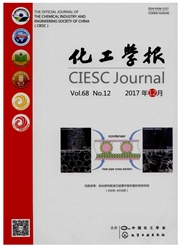

 中文摘要:
中文摘要:
用乙二醇还原法制备了Pt颗粒平均粒径分别为2.0、4.6、12.1nm的Pt/Al2O3催化剂,同时用浸渍法制备了PtSn/Al2O3双金属催化剂,并考察了各催化剂在丙烷脱氢过程中的结焦行为。分别用H:化学吸附、透射电镜、热重分析、元素分析、红外光谱、拉曼光谱等手段对催化剂进行了表征。表征结果显示,催化剂金属上的结焦速率与Pt金属颗粒粒径密切相关。具有较小Pt颗粒的催化剂金属上的结焦速率明显大于具有较大Pt颗粒的催化剂。具有较小Pt颗粒的催化剂上生成的焦含有较少的氢,其石墨化程度也较高。本研究中Ptsn/Al2O3催化剂金属上的结焦速率高于Pt/Al2O3催化剂,并且在双金属上生成的焦具有更高的石墨化程度。结合Pt/Al2O3催化剂上的结焦机理,对高性能丙烷脱氢催化剂提出了新的概念设计。
 英文摘要:
英文摘要:
Pt/Al2O3 catalysts with Pt particle sizes of 2.0, 4. 6 and 12.1 nm were prepared by the ethylene reduction method and used to study the effect of Pt particle size on coking rate and nature of coke formed. Meanwhile, a PtSn/Al2O3 catalyst was also prepared by the impregnation method in order to elucidate the effect of Sn addition on coking properties of Pt catalyst. The catalysts were characterized by H2 chemisorption, TEM, thermogravimetric analysis, elemental analysis, infrared spectroscopy and Raman spectroscopy, respectively. The experimental results showed that coking rate on Pt metal decreased with increasing size of Pt particle. The coke formed on smaller Pt particles was of higher degree of graphitization and lower content of hydrogen. Moreover, for PtSn/Al2O3 catalyst, its coking rate on Pt metal was higher than that of Pt/Al2O3 catalyst, and the coke formed was also of higher graphitization. Using coke formation mechanism obtained, a conceptual design of catalyst with high performance for propane dehydrogenation was then tentatively proposed.
 同期刊论文项目
同期刊论文项目
 同项目期刊论文
同项目期刊论文
 期刊信息
期刊信息
